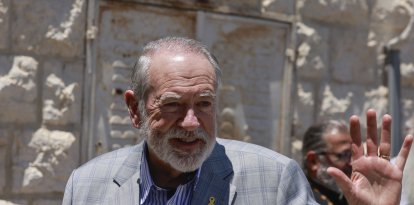Praise for Carlos Alberto Montaner
The director of Voz Media published an article on Carlos Alberto Montaner in 2010 after he was awarded the Juan de Mariana Prize. Here we republish the piece it in its entirety.

(Casa de América)
The very courageous members of the Juan de Mariana Institute have just awarded their prize, which recognizes paths intimately linked to the fight for freedom, to Carlos Alberto Montaner, a pro-Cuban who does not know how to dance the chachachá but is much friendlier to the truth than to Silvio Rodríguez.
Since I consider myself one of his most fervent disciples, and certainly the loudest, I offered to give a talk at the Institute's messy headquarters (messy because that's how we liberals are, and because Mr. Calzada refused to grease the palm of some Gallardón Boys and, of course, there has been no way to make it more presentable and turn it into a literary café) that would give a succinct account of his life and miracles. I gave the talk. It was not succinct. I titled it "Carlos Alberto Montaner: Horace is Liberal." I will talk about the speech and about him, but I promise to be brief and more concise.
Carlos Alberto Montaner (Havana, 1943) is, as all those who know him and most of those who do not still know, a quiet man. At the age of 14, he met the beautiful Linda as he survived an attack and married her at the age of 16. Before the age of 18, he had his daughter Gina, saluted the "barbudos," was imprisoned by the barracks of the Cuban Revolution and escaped from prison as to not live behind bars those 20 years that he was sentenced to but that he did not have to spare. All this in spite of being covered in shit every now and then by those who, word to God, truly stink; in spite of the fact that real killers sent him a fake bomb in a book (the sons of bitches chose "A Sweet Death"). Life has hit him hard, as if due to the hatred of God. But he, an elegant man, goes on and does not complain. Despite the fact that his opponents tried to take him down, he was a good sport: because Montaner may be a quiet man, but above all, he was an elegant one. The one who could.
Ever since he left Cuba, though his motherland always stayed in his heart, he has traveled throughout the Americas, his other motherland, preaching the virtues of liberty, denouncing the excesses of socialists from all parties and the cruelty of all tyrants; crying out for the freedom of his island, forging conciliations, stretching out his hands; all to invalidate the verse from José Martí once and for all:
Montaner, friend and teacher, speaks and writes clearly. He is entertaining, ironic, didactic. He teaches by enchanting. The absent-minded will now understand the title of my hurried talk: "Carlos Alberto Montaner: Horace is Liberal" (but it was my mistake that in the talk, when I threw the explanatory paper at myself, I turned the Latin classic into Greek).
In the talk, I spoke about a few of the honoree's works. By reading just a few of Montaner's books, one can begin to gather a culture, get a sensible and complete idea of this world that moves more than worms, although sometimes only to change into nothing.
"Journey to the Heart of Cuba," for example, is a very interesting summary of the history of independent Cuba that allows us to understand many of the things that are happening there now. "I wrote it," he explains in the prologue in its recent republishing, "so that [the leaders who were going to attend the Ibero-American Summit in Havana in 1999] would understand what Cuba was and what the revolution that had occurred there consisted of. A friendly president arranged for copies of the book to be sent to his colleagues. Some gratefully acknowledged its receipt. Others, such as Hugo Chávez, accused me of lying. It's all part of the job."
"Journey to the Heart of Cuba," like "Cuba, A Century of Painful Lessons" and so many of Carlos Alberto's other works, is still a kind of inquiry into the crucial question, the Caribbean version of the one made famous by Zavalita in "Conversation at the Cathedral": At what point did Peru get screwed? At what point did the largest of the Antilles go to ruin? It wasn't on Jan. 1, 1959, when Fidel the Felon entered Havana; not on the day Batista destroyed Cuban democracy. But when, before 1902, long before 1898, Cubans created the political, economic, cultural and civilizational conditions that made the emergence and survival of the Tyrannosaurus and his shady, resentful brother possible.
Unfortunately, the Zavalitic question can be asked of all the countries of the Hispanosphere. Try it, try it. How is Venezuela like this? What's wrong with Argentina? Did Mexico ever have a fix? Montaner tried. He read, analyzed, observed and talked, culminating in "Twisted Roots: Latin America's Living Past," which Mario Vargas Llosa called "an indispensable book." And, yes, it was a sort of parody of The Idiot's Bible, "Open Veins of Latin America" by Eduardo Galeano, a sworn enemy of freedom.
Being a book with a strong impact on the dark side of the Spanish legacy (authoritarianism, "caudillismo," fanaticism, mistrust towards the individual and voluntary relationships, fear of freedom), it may be uncomfortable for readers on this side of the pond (Europe). But this is the way things are, and those who do not want to see it for what it is have little love for their country. This is what Montaner said in this regard in November 2002, in a debate on this book that I organized in the university newspaper Menos 25:
How could I not mention "Guide to the Perfect Latin American Idiot" (and Spanish idiot, for that matter), that enlightened so many. But, precisely for that reason, I did not say much. I preferred to dwell on its sequel, the unjustly neglected "Manufacturers of Misery."
This book was perhaps more forceful, devastating to politicians, demagogues and thieves (pardon the redundancy), the military who, hammer in hand, treat all problems as if they were nails. Then there are the priests who ignore those who have fallen hard times and use violence to impose their radical ideas. There are the intellectuals, almost always thinking for tyrants and against freedom; the unions, who are rancid bullies who crush workers and those who aspire to be such but do not dance to their tune. There are the lobbyist businessmen who would be nothing without their quacks in politics and official journals. There are the elephantine universities, addicted to their fatuous and criminogenic thinking, and finally, there is the State, the State of Discomfort: abusive, clumsy, corrupt and maniacal, the acid that corrodes Hispanic American societies.
I could talk about more and more books ("Dog World," "La Última Batalla de la Guerra Fría" ("The Last Battle of the Cold War") the strange yet delightful "De la Literatura Considerada Como una Forma de Urticaria" ("Of Literature Considered as a Form of Hives"), but I promised to be brief and concise, and I am about to break my word. So I will end here, but not before pointing out that, to top it all off, Carlos Alberto Montaner, a model and brilliant intellectual, is a good man in the best sense of the word. He knows, unlike Sartre, that horned viper with cataracts, that it is not hell but heaven that lies within others...
But you have to know how to reach it.

























